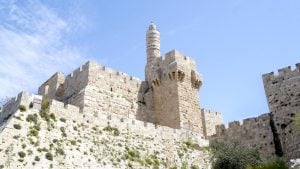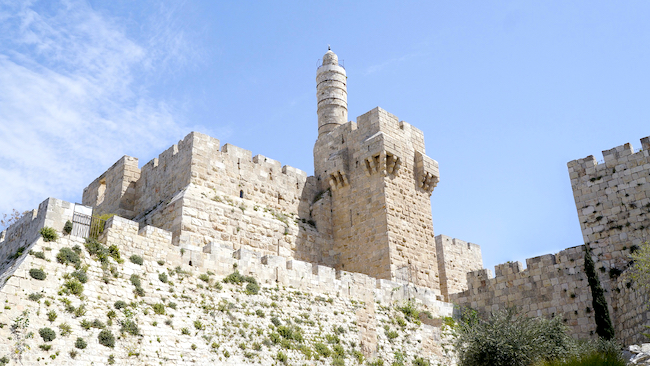
Ovadiah 1:1–21
World Nations’ Brotherhood
We are often baffled by the deaf ear that world powers turn towards the pleas
of our Jewish brethren, particularly in Eretz Yisrael. Although world nations
appear, at times, to show us a friendly peaceful face, they suddenly develop a
hostile policy towards our innocent, well-meaning people. How does one
explain their abrupt change in nature? This week’s Haftarah together with our
weekly Parsha provide much insight into this matter.
Edom’s Strategic Brotherhood
The Haftarah begins with a moving plot against Eisav’s descendent, Edom. Ovadiah
Hanavi said, “How did Eisav become pillaged, and his hidden treasures sought out? To
the borders they sent you [Edom], all your allies enticed you, then they were able to
overtake you…” (1:6-7) Those words refer to the historic moment when Edom’s allies
pretended to defend him from a powerful enemy. They accompanied Edom all the way to
his borders, and then they suddenly abandoned him. They immediately rushed back into
his land and pillaged his entire country.
Ovadiah chose this incident to display world nations’ response to Edom’s unique
sense of “brotherhood”. He would typically show his loyalty towards his allies (in pursuit
of their friendship) and would then use his loyalty as a perfect front for his devious ways.
When the appropriate moment would arrive, he would conveniently abandon his allies
and leave them stranded to fall prey to their enemies. This time, his allies responded in
kind, and lured him into war only to turn on him and pillage his entire land.
Edomite Loyalty
This two-faced nature explains Edom’s general relationship with the Jewish people
throughout the Diaspora. Ovadiah continues and depicts Edom’s behavior towards the
Jewish people during their Roman exile. He tells Edom, “On the day the nations took the
Jewish people captive and entered the Jewish gates and cast lots over Yerushalyim, you
were also amongst them.” (1:11) Even though the war over Yerushalyim was essentially
fought by the Romans, who were not descendants of Eisav (see Malbim 1:1), the
Edomites could not resist the opportunity of participating in the war. Malbim reminds us
that those Edomites were alleged Jewish converts who had embraced Judaism during
Herod’s reign. Since they had given the impression of sincerity, they were warmly
accepted by the Jewish people. But, as would be predicted, Edomites can never be
trusted in time of need. And when the Jewish people were down, our newly accepted
“brother” rallied against us and readily assisted in destroying us. (Malbim 1:1, 11)
This two-faced approach already appeared during the Babylonian era when the
Edomites helped defeat the Jewish nation. Ovadiah said, “Don’t stand by the
crossroads to finish off the refugees.” (1:14) Chazal interpret this passage to refer to
Edom’s wicked strategy during the Jewish people’s first exile. He distanced himself
from the Babylonian army and waited for the outcome of the war. He reasoned that if
the Jewish people would win the war, he would claim that he was stationed to help
rescue them; and if the Babylonians would win the war, he would help them finish off
the fleeing Jewish refugees. (Yalkut Shimoni 549)
Once again, we see Edom’s unique sense of “brotherhood”. His two-faced character
allowed him to pass as an ally awaiting to assist his brother in his time of need. But, in
truth, he was only capitalizing his opportunity and preparing himself to eradicate all
remaining traces of the Jewish people, should the opportunity arise.
Eisav’s Sense of Brotherhood
Edom’s approach to brotherhood traces itself to his ancestor Eisav. We read in this
week’s Parsha how Eisav ran towards his brother Yaakov and embraced him. Although
Eisav harbored perpetual hatred towards Yaakov, he momentarily underwent a change
in nature. Yaakov had sent Eisav an elaborate present as a gesture of true friendship,
and, for the first time in the two brothers’ lives, a sense of kinship seemed to develop
between them. (Rashi 33:4) The Torah records that incident and states, “And he [Eisav]
ran towards him [Yaakov], embraced him, fell on his neck and “kissed” him.” (Bereishis
32:4) Although Eisav’s action seemed to reflect warm acceptance of his brother, Chazal
note that the word “kissed” is written with dots above it. They explain that the dots
detract from the overt meaning of the word and reveal an inner dimension of the matter.
Chazal explain that Eisav actually attempted to bite Yaakov, but was unsuccessful in
his endeavor. This subtlety exposes the origins of Edom’s policy of brotherhood. After
Eisav embraced his brother and showed him warm friendship, he took full advantage of
his close proximity to Yaakov’s neck and “turned” on his brother by attempting to bite
him. (Nachlas Yaakov on Rashi ad loc.)
Let us momentarily reflect upon this incident. Rashi explains that Eisav was touched
by the honor Yaakov afforded him. The Torah relates that in addition to Yaakov’s
elaborate gift, he prostrated himself before his older brother seven times. Eisav was so
moved by this display of submission that he felt strong compassion towards his brother,
and he sincerely embraced him for the first time in his life. If so, why did Eisav suddenly
revert to his old behavior and attempt to bite Yaakov? The apparent answer is that
Eisav’s perpetual hatred was too deep to be silenced. Although Eisav was experiencing
warm feelings towards his brother, he could not resist this perfect opportunity. Now that
his mouth was on Yaakov’s neck he could not subdue his perpetual feelings of hatred,
and he felt compelled to express them and to bite his “beloved” brother.
Perpetual Hatred
This reveals to us an additional dimension of the relationship between Eisav’s
descendant Edom and Yaakov’s descendants, the Jewish people, and teaches us never
to trust his warm gestures towards us. We learn from here that Edom always harbors
hostility towards the Jewish people and even when he displays sincere friendship and
brotherhood, he cannot subdue his true feelings. Chazal declare this in their succinct
statement, “The halachic ruling is that Eisav hates Yaakov.” (Rashi) Chazal use the word
“halachic” here to connote Eisav’s non-compromising stand, and they remind us with this
to never be misled by Edom’s friendship. Although his warmth can at times be somewhat
sincere, Edom cannot silence his innermost feelings. We must always remember that
when the coveted opportunity will present itself, Eisav’s descendants will take full
advantage of it and will harm the Jewish people in every possible way. Unfortunately,
Edom’s deep-seated hatred will remain throughout the generations until the final day of
redemption when, as Ovadiah predicts, “The saviors will rise from Har Tzion to judge the
inhabitants of Eisav’s mountain, and then the perfect reign will belong to Hashem.”
(1:21)
Beware of Edom
In summary, our weekly Parsha and Haftarah reveal the true nature of Edom and his
two-sided approach to brotherhood. We learn from here Edom’s perpetual hatred for the
Jewish people and to never trust his friendly gestures. Although there may be moments
when he displays signs of brotherhood, we must be wary of them and never establish
close association with him.
Although it is difficult to establish the genealogy of our alleged allies, there may be
traces of Eisav in some of today’s major world powers. This unfortunate reality explains
much of our present historic era and severely warns us not to place our trust in any
nation. In view of this let us commit ourselves to Chazal’s directive regarding the era
preceding Mashiach, “Upon whom can we [truly] rely upon, [only on] our Father in
Heaven” (Sotah 49b)


